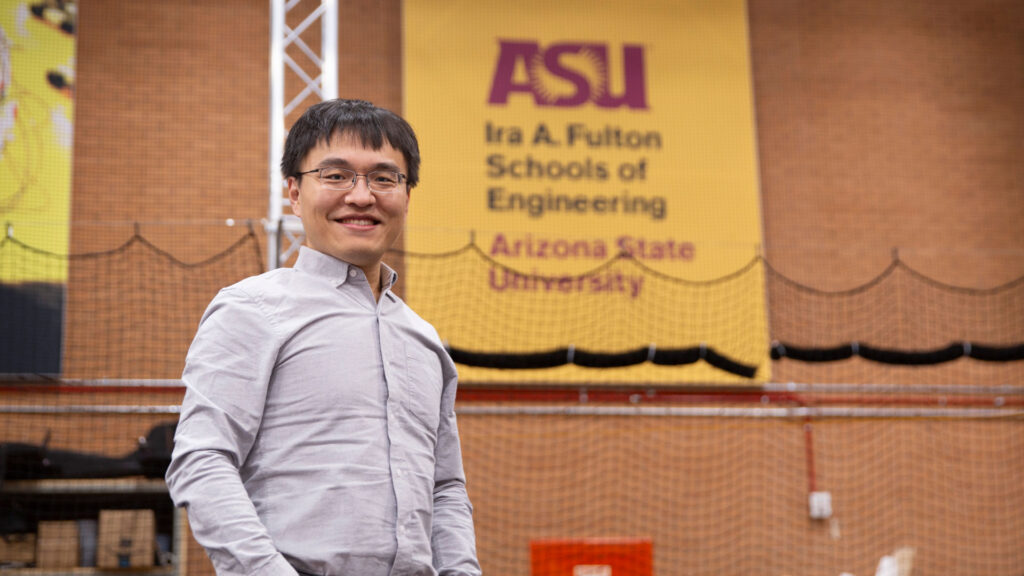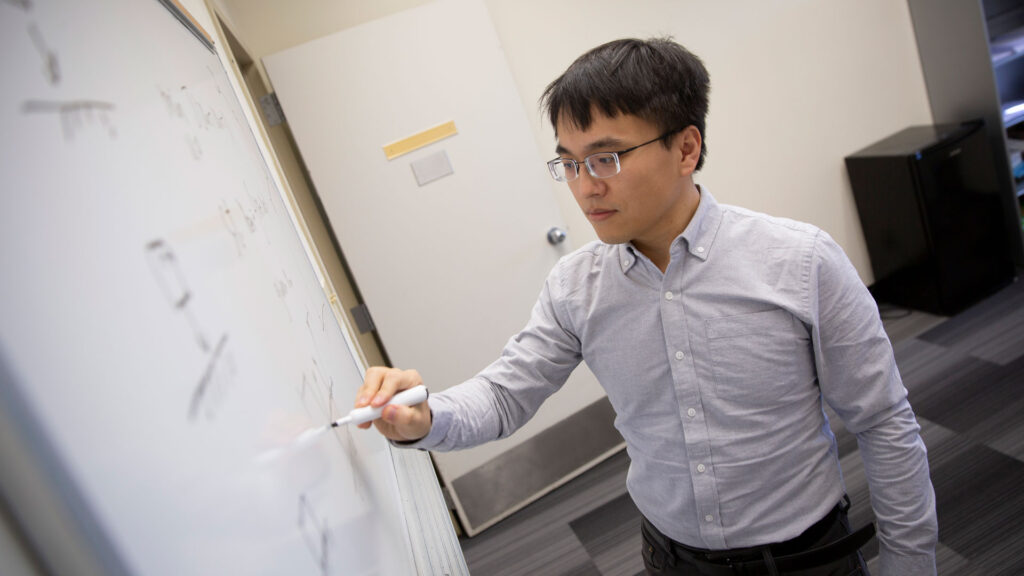Q&A with faculty mentor Wanxin Jin
Posted on: March 26, 2024
Posted on: March 26, 2024
Wanxin Jin is an assistant professor of mechanical and aerospace engineering in the School for Engineering of Matter, Transport and Energy. He has been mentoring graduate students since he started his faculty position in the Fulton Schools in fall 2023 and recently began mentoring students in the Master’s Opportunity for Research in Engineering program. His research interests include robotics, control systems and machine learning with a particular focus on autonomous robots interacting with humans and the environment.

What made you want to get involved as a MORE faculty mentor?
I see the Fulton Schools MORE program as an excellent opportunity for master’s degree students to gain valuable research experience in robotics. Given that my research and teaching focus is on robot control and learning, in my class and lab I consistently encourage and support students interested in this field to seize the opportunity and engage in robotics projects. These experiences not only contribute to their academic development, but also offer a chance to address challenging problems in robotics through hands-on research. It’s a joyful journey to witness their growth and solve real-world problems.
What is your favorite part about seeing your students conduct research?
My favorite part is witnessing their intellectual and personal growth throughout the process. It’s rewarding to observe them tackle challenging problems, develop critical thinking skills and become more independent researchers. I take great joy in guiding them through the research journey, from formulating problems to overcoming obstacles and ultimately presenting their results.
How have your MORE students had an effect on your research?
My project focus stems from discussions with my mentored students, aligning their interests and skills with the overall direction of my lab. Consequently, the achievements or progress made by the MORE students play a crucial role in advancing the research endeavors of my research group.
Have the students come up with any research surprises or proposed new directions for your lab?
Certainly! Given that their project topic represents a new and novel research direction in the robotics field, every step of the exploration, no matter how incremental, brings a sense of surprise and excitement to both myself and my students. One particular joy is that after having tried numerous methods, we finally found a working solution. This moment is undoubtedly the most rewarding.
What have you gained from being a MORE mentor?
One of the most significant gains is the opportunity for continuous learning and growth. Interacting with motivated students has exposed me to diverse perspectives, pushing me to stay updated on the latest developments in my field.
How has the experience been rewarding for you?
Seeing the progress and achievements of my students is immensely rewarding. It’s not just about imparting knowledge to the students, but also about creating a collaborative environment between me and my students where ideas for addressing a challenging problem grow from infancy to maturity.
What advice would you give to students who might be interested in participating in FURI or MORE?
Explore your interests: Identify your interests and passions within your field of study. FURI and MORE projects offer a chance to delve deeper into topics that truly captivate you.
Connect with faculty: Reach out to faculty members who share your research interests.
Discuss your ideas, ask questions and seek guidance on potential projects.
Start early: This includes researching potential projects, reaching out to faculty mentors and crafting a well-thought-out proposal. Early engagement increases your chances of finding the right fit for your interests.
Commitment: Plan your time effectively to balance coursework and research responsibilities. Consistency and dedication are key to a successful research experience.
Present and publish: Take advantage of opportunities to present your research findings at conferences or publish your work. This not only enhances your academic profile, but also allows you to share your discoveries with the broader community.
Why should other faculty members become FURI/MORE mentors?
I believe there are three reasons to get involved:
Nurturing future researchers: Serving as a mentor allows faculty members to play a pivotal role in nurturing future researchers in a related field or in your group. By guiding students through the research process, the student can develop their critical thinking skills and problem-solving abilities, preparing them to be a successful researcher in the future.
Enhancing mentoring skills: Interacting with students in a research setting fosters effective communication, the ability to explain complex concepts and the cultivation of a collaborative mentoring environment.
Research productivity and innovation: Mentorship is often involved in research projects that contribute to faculty members’ own research productivity. The exchange of ideas and the exploration of novel concepts with students can bring fresh perspectives and innovative approaches to the mentor’s own research.

Professor Jin makes tasks challenging. With guidance from the professor, I have had to learn on my own many of the topics such as optimal control theory. I have enjoyed this as it drives me to work harder and reach that ‘aha’ moment when I figure things out.
Hussain BhavnagarwalaMechanical engineering MORE student